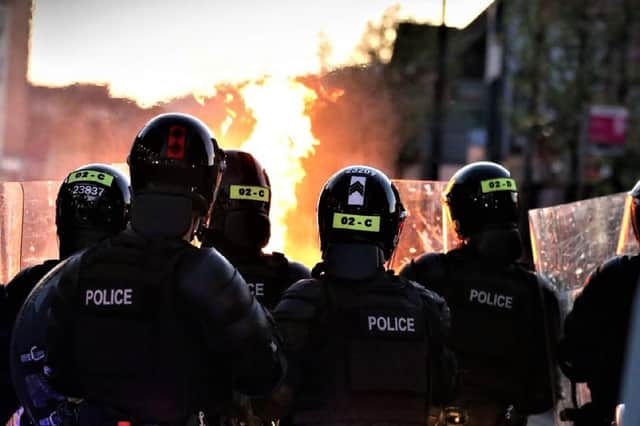‘We need to decide what the PSNI are actually for: stopping violence and gangs or policing opinions’


(See March 19, Northern Ireland Hate Crime Bill: Justice Minister Naomi Long consults on end of private dwelling legal defence which critics say could lead to ‘Big Brother’ in NI living rooms).
There’s no crime of hate speech as such in Northern Ireland, though hate speech ‘incidents’ are recorded by police.
Advertisement
Hide AdAdvertisement
Hide AdWhilst the PSNI has long maintained that no evidence is required for recording something as a ‘hate crime’ or ‘hate incident’ in Northern Ireland (saying instead that it comes down entirely to someone’s belief that it was motivated by hate), here is what the College of Policing said a couple of months ago:
“For allegations of hate incidents, police need to apply their judgement in establishing whether there is hostility towards a protected characteristic group.
“If, having applied their judgement and taking account of the full context, no hostility is found, the incident should not be recorded as a hate incident.
“Additionally, policing will need to consider whether the incident in question might be dealt with in a way that is less intrusive and that does not infringe freedom of expression, for example, signposting to alternative areas of support or ways of raising concern.”
Advertisement
Hide AdAdvertisement
Hide AdA further guideline states that “particular care is needed when the incident complained of takes place as part of debate...”
Even where these guidelines are broadly acceptable, the proposed new legislation could expand the policing of ‘thought’ by adding attitudes of “bias, prejudice, bigotry and contempt” as “indicators of hate”.
The staff in the Public Prosecution Service would also have to make such assessments – even though, like police officers, they are not qualified either as clinical psychologists or behavioural scientists.
To be absolutely clear, I am most certainly not suggesting that victims of despicable hatred should have to accept that the perpetrators of their distress go unpunished.
Advertisement
Hide AdAdvertisement
Hide AdAs a Christian pastor, I am deeply disturbed that such hatred grossly demeans the value of human beings created in the image of God.
What I do find very troubling is that officers would be required to make a judgement on motivation, bias, bigotry, prejudice or contempt – with there being no suggestion at present of any objective or transparent criteria for such assessment.
“Bias”, for example, may simply mean preferences or strongly-held beliefs – and is there anyone on this planet who does not have these?
Prejudice is certainly an unfair or unreasonable opinion – but against what criteria will a PSNI officer decide that what I say is unfair or unreasonable, especially if my views are commonplace and shared by many others?
Advertisement
Hide AdAdvertisement
Hide AdAs for bigotry, it certainly exists. Bitterness and intolerance are all too common – listen to some of our politicians or simply ask JK Rowling, the author of the Harry Potter books, about the abuse she has received in recent times.
As currently presented, the new proposals are deeply troubling, for they take us into the territory of the holding and communicating of apparently unacceptable opinions.
Free speech is under very serious threat.
The desire to have police officers make complex and far-reaching judgements, perhaps even on the spot, is simply too much to ask, against the wider background of serious drug dealing, organised crime, sexual violence, and on-line crime.
Our society needs to ask itself, what are our police actually for?
Advertisement
Hide AdAdvertisement
Hide AdThis is an urgent and difficult question not least because the Chief Constable has warned the Policing Board that the number of officers in Northern Ireland is set to fall to 6,719 as the force struggles to balance its budget.
Part of the answer is that the PSNI needs to be allowed to put first things first.
The policing of Covid-19 became a reputational quagmire for them.
Policing such new proposed laws could well land them in another one.
Advertisement
Hide AdAdvertisement
Hide Ad– Rev Norman Hamilton is a former moderator of the Presbyterian Church in Ireland
More on free speech issues from the News Letter:
PSNI mulling over landmark judgement on recording non-criminal acts which people find offensive
NI hate crime reviewer: People should not be free to abuse Islam and Christianity
——— ———
A message from the Editor:
Thank you for reading this story on our website. While I have your attention, I also have an important request to make of you.
Advertisement
Hide AdAdvertisement
Hide AdWith the coronavirus lockdowns having had a major impact on many of our advertisers — and consequently the revenue we receive — we are more reliant than ever on you taking out a digital subscription.
Subscribe to newsletter.co.uk and enjoy unlimited access to the best Northern Ireland and UK news and information online and on our app. With a digital subscription, you can read more than 5 articles, see fewer ads, enjoy faster load times, and get access to exclusive newsletters and content.
Visit
https://www.newsletter.co.uk/subscriptionsnow to sign up.
Our journalism costs money and we rely on advertising, print and digital revenues to help to support them. By supporting us, we are able to support you in providing trusted, fact-checked content for this website.
Ben Lowry, Editor